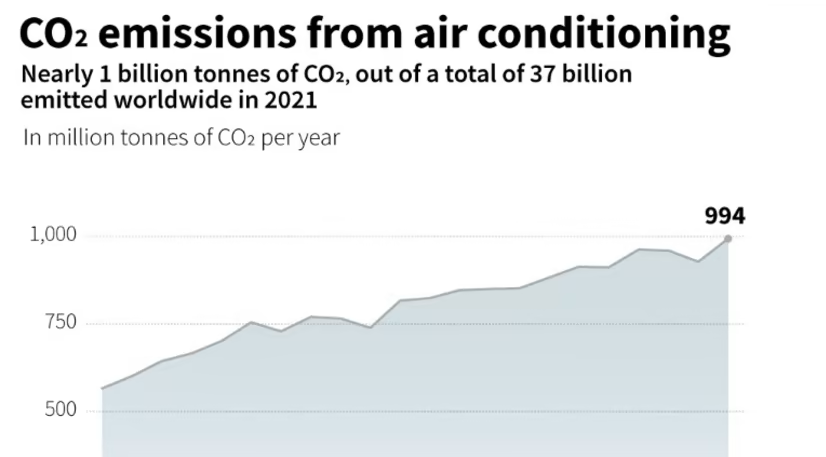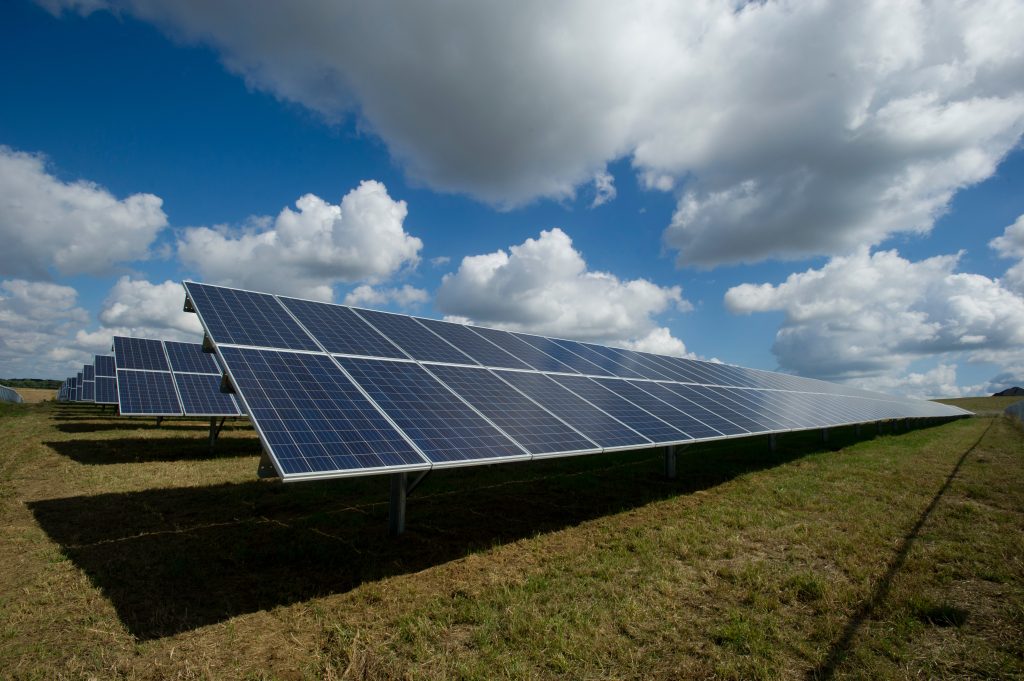On 24th July this year, Singapore issued a national heat stress advisory in anticipation of increasing temperatures and warm weather in the coming days – with National Environmental Agency (NEA), which has nine Wet Bulb Globe Temperature (WBGT) monitoring stations islandwide, using their readings to gauge heat stress risk levels.
In this warming world, is the use of air conditioners something inevitable?
On this topic, it has been proven that while they bring immediate, life-saving relief, air-conditioners come at a cost to the climate crisis because of their enormous energy requirements. Air-conditioning brings us approximately one billion metric tonnes of carbon emissions per year, according to the International Energy Agency (IEA), out of 37 billion emitted worldwide. (refer to Fig 1)

Fig 1: CO2 emissions from air-conditioning. (Photo: AFP/Sylvie HUSSON,
Valentina BRESCHI)
The Negative impacts of Air conditioners
While studies show that the risk of heat-related deaths decreases by about three-quarters for those living in air-conditioned homes, it doesn’t dismiss the fact that it brings along gases that pollutes the environment and contributes to climate change.
Did you know that air-conditioners are notoriously known for being a potent danger in causing global warming? Similar to refrigerators, it contains a cooling agent called hydrofluorocarbons, or HFCs – whose effect on global warming is two-fold. The World Economic Forum (WEF) has estimated that, if not reined in, air conditioning-related greenhouse gas emissions could potentially account for up to a 0.5 degree Celsius rise in global temperatures by the end of the century.
The increased use of cooling systems, like air-conditioners, means higher energy consumption and carbon emissions(generated by the burning of fossil fuels) are expected globally.
So, how can we take action to do something about it?
Harnessing the Power of the Sun
Solar Photovoltaic (PV) systems are known to generate electricity through the conversion of sunlight(solar energy) that reflects onto the solar panels. As compared to traditional energy sources like fossil fuels, having a solar system is a natural way to make use of renewable energy while being conscious of the environment.
The government has been very supportive in recent years when it comes to the installation of solar panels and funding of research on the improvement towards solar technology in Singapore. But why Solar?
Here are some of the benefits of having Solar Panels and making use of solar power:
- Reducing Carbon Emissions
Solar energy is a clean and renewable alternative, emitting zero carbon dioxide and other harmful pollutants during operation. By replacing fossil-fuel-based electricity with solar-generated power, the carbon footprint associated with cooling systems is significantly reduced. - Offset energy consumptions
By integrating solar panels into buildings and facilities, a portion of the energy required for air conditioning and cooling systems can be sourced from the solar-generated electricity. This offsets the energy demand from the grid, reducing the overall electricity consumption. - Lower Electricity Bills
With lower energy consumption, the investment in having a solar system also means the cost of electricity bills would be lower in the long run, while playing a part in a more sustainable future.
Adopting Solar
Moreover, the adoption of solar solutions aligns with Singapore’s commitment to sustainable practices and environmental stewardship. With solar becoming increasingly affordable and accessible, more individuals, businesses, and institutions, including schools and private organisations, are turning to solar PV systems to power their facilities sustainably.
A few of the successful projects in Singapore includes:
- Solar PV Installations in Public Buildings: The Singapore government has actively promoted the adoption of solar photovoltaic systems in public buildings. For instance, solar panels have been installed on the rooftops of schools, community centres, and HDBs.
- Solar Farms and Floating Solar Panels: We have been exploring innovative ways to maximise its solar energy potential. Additionally, floating solar panels on reservoirs have become a unique feature in Singapore’s renewable energy landscape, utilising underutilised water surfaces to generate electricity.
- Solar-Powered Public Transportation: Our public transportation system has also embraced solar power, by installing solar on the roof of buses under one of the bus service operators, Go-Ahead Singapore.
The successful solar projects in Singapore demonstrate the transformative potential of solar energy in reducing energy consumption and carbon footprint. From public infrastructure to community-driven initiatives, solar solutions have become an integral part of Singapore’s sustainable development journey.
As the nation continues to address the challenges of climate change and rising energy demand, the adoption of solar PV systems plays a vital role in shaping a greener and more sustainable future. By harnessing the power of the sun, Singapore can pave the way towards a low-carbon economy and become a model for other urban centres aspiring to achieve environmental resilience.
As the solar industry advances and technologies improve, the integration of solar power is poised to accelerate, creating a more sustainable and vibrant Singapore for generations to come. By embracing solar solutions and supporting clean energy initiatives, we can collectively contribute to mitigating the impacts of climate change and preserving our planet for future generations.
–
You can help in being a hero of environmental sustainability and include solar panels to cut down on your electricity bills too! Here at SunPro Energies, we are committed to providing solar solutions for your residential, commercial and industrial needs. Contact us to enquire more and arrange for a free site visit.
References:
Straits Times https://www.straitstimes.com/singapore/environment/national-heat-stress-advisory-launched-as-world-hots-up,
CNA https://www.channelnewsasia.com/sustainability/warming-world-air-conditioning-inevitable-3671901,
CNN https://edition.cnn.com/2025/06/09/asia/air-conditioning-singapore-climate-change-intl-hnk-dst/index.html



